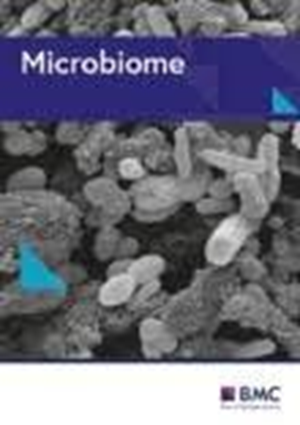Enrichment of novel entomopathogenic Pseudomonas species enhances willow resistance to leaf beetles
IF 13.8
1区 生物学
Q1 MICROBIOLOGY
引用次数: 0
Abstract
Plants have evolved various defense mechanisms against insect herbivores, including the formation of physical barriers, the synthesis of toxic metabolites, and the activation of phytohormone responses. Although plant-associated microbiota influence plant growth and health, whether they play a role in plant defense against insect pests in natural ecosystems is unknown. Here, we show that leaves of beetle-damaged weeping willow (Salix babylonica) trees are more resistant to the leaf beetle Plagiodera versicolora (Coleoptera) than those of undamaged leaves. Bacterial community transplantation experiments demonstrated that plant-associated microbiota from the beetle-damaged willow contribute to the resistance of the beetle-damaged willow to P. versicolora. Analysis of the composition and abundance of the microbiome revealed that Pseudomonas spp. is significantly enriched in the phyllosphere, roots, and rhizosphere soil of beetle-damaged willows relative to undamaged willows. From a total of 49 Pseudomonas strains isolated from willows and rhizosphere soil, we identified seven novel Pseudomonas strains that are toxic to P. versicolora. Moreover, re-inoculation of a synthetic microbial community (SynCom) with these Pseudomonas strains enhances willow resistance to P. versicolora. Collectively, our data reveal that willows can exploit specific entomopathogenic bacteria to enhance defense against P. versicolora, suggesting that there is a complex interplay among plants, insects, and plant-associated microbiota in natural ecosystems.新型昆虫病原假单胞菌物种的富集增强了柳树对叶甲虫的抗性
植物进化出了各种抵御昆虫食草动物的机制,包括形成物理屏障、合成有毒代谢物和激活植物激素反应。虽然植物相关微生物群会影响植物的生长和健康,但它们在自然生态系统中是否在植物抵御害虫的过程中发挥作用还不得而知。在这里,我们发现,受到甲虫危害的垂柳(Salix babylonica)树叶比未受到甲虫危害的树叶更能抵抗叶甲虫 Plagiodera versicolora(鞘翅目)。细菌群落移植实验证明,来自甲虫损害的垂柳的植物相关微生物群有助于提高甲虫损害的垂柳对 P. versicolora 的抗性。微生物组的组成和丰度分析表明,与未受损的柳树相比,受损柳树的叶球、根部和根瘤土壤中的假单胞菌属明显富集。从柳树和根圈土壤中分离出的 49 株假单胞菌中,我们发现了 7 株对 P. versicolora 有毒性的新型假单胞菌。此外,用这些假单胞菌株重新接种合成微生物群落(SynCom)可增强柳树对P. versicolora的抗性。总之,我们的数据揭示了柳树可以利用特定的昆虫病原菌来增强对P. versicolora的防御能力,这表明在自然生态系统中,植物、昆虫和植物相关微生物群之间存在着复杂的相互作用。
本文章由计算机程序翻译,如有差异,请以英文原文为准。
求助全文
约1分钟内获得全文
求助全文
来源期刊

Microbiome
MICROBIOLOGY-
CiteScore
21.90
自引率
2.60%
发文量
198
审稿时长
4 weeks
期刊介绍:
Microbiome is a journal that focuses on studies of microbiomes in humans, animals, plants, and the environment. It covers both natural and manipulated microbiomes, such as those in agriculture. The journal is interested in research that uses meta-omics approaches or novel bioinformatics tools and emphasizes the community/host interaction and structure-function relationship within the microbiome. Studies that go beyond descriptive omics surveys and include experimental or theoretical approaches will be considered for publication. The journal also encourages research that establishes cause and effect relationships and supports proposed microbiome functions. However, studies of individual microbial isolates/species without exploring their impact on the host or the complex microbiome structures and functions will not be considered for publication. Microbiome is indexed in BIOSIS, Current Contents, DOAJ, Embase, MEDLINE, PubMed, PubMed Central, and Science Citations Index Expanded.
 求助内容:
求助内容: 应助结果提醒方式:
应助结果提醒方式:


